Nestled in the heart of India, a land of economic triumphs and challenges; we witness a compelling tale of triumph and turmoil. Amid this paradox, the fallout of poor waste management and hush-hush dumping of non-recyclable waste and sewage has cast a grim shadow on India’s once-pristine lakes and rivers. Former havens of leisure have turned into breeding grounds for waterborne illnesses. Yet, resilient environmental champions have emerged, spinning tales of innovation and unwavering determination to save this precious resource. Leading the way is Clean-Water, a company ignited by the passion of its founder, Priyanshu Kumath. They are on fervent mission to combat the relentless tide of water pollution and scarcity.
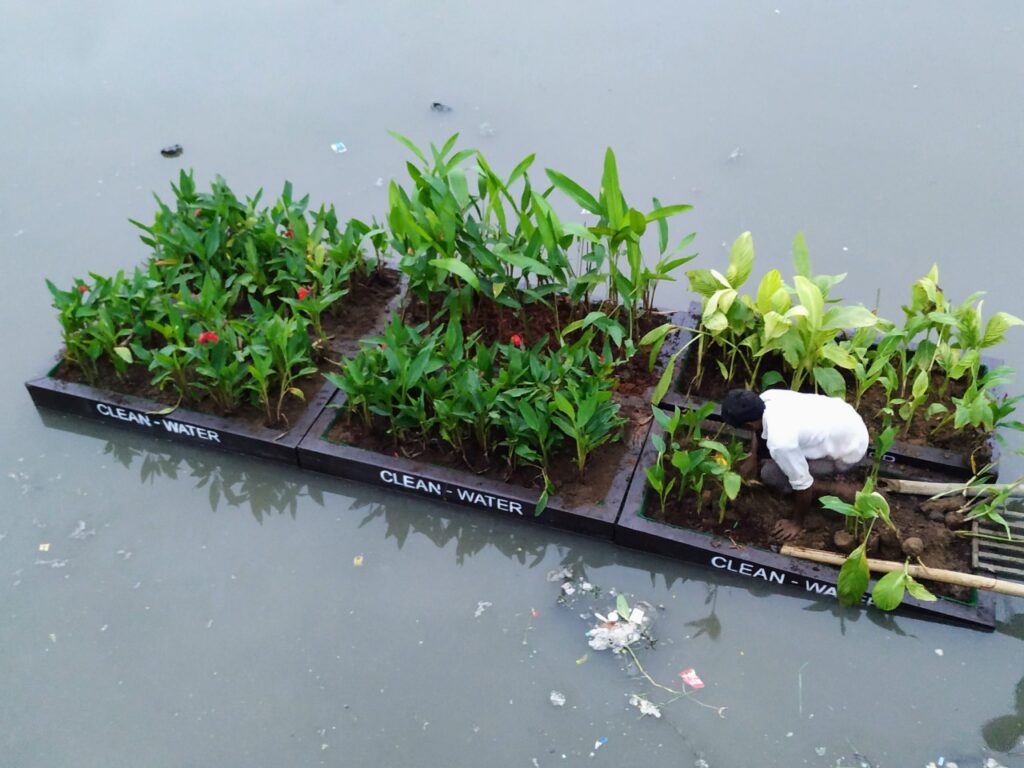
With the country’s waterways becoming increasingly polluted and about 70% of the surface water unfit for consumption, resolute action has became a must instead of a choice. Priyanshu Kumath, with a deep inclination towards environmental conservation, understood that steady action was needed to restore the widespread lakes and rivers that were in a state of dilapidation. Clean-Water, an organization committed to the same, does not only provide sustainable solutions to restore the ecosystem but also implements cutting-edge biotechnology to ensure that their solutions are long-lasting and viable.
Journey from a corporate employee to the founder of a clean-tech startup
Clean-Water’s founder and CEO, Priyanshu Kumath, traces his eco-conscious roots back to his younger days. In 6th grade, he tagged along on a school field trip to a Sewage Treatment Plant, mostly just to dodge schoolwork like any kid. But, somewhere in the back of his young impressionable mind, the trip left a mark. That short visit to the plant sparked the beginning of his green journey.

Rolling forward the years, he returned to the same school; Choithram School Indore, as an entrepreneur and environmentalist to shape the young minds. He gave a TEDx talk on the importance of clean, sustainable water; and urged the youth to turn towards the environment and fight climate change.
Hailing from Indore, Madhya Pradesh, Kumath is an IIT-Bombay alum with a rich background in civil engineering and real estate. He sharpened his expertise at renowned firms like Godrej Properties and Liases Foras, where he worked as an analyst. His journey continued at housing.com, where he led a team of 700+.
“It was more about the choice of life, towards the end of my stint at housing.com, I thought to myself what I should be doing next, this introspection went pretty deep and the answer I came up with was that the best way I could be spending my life-time was to spend it solving the most pressing problems of today,” Priyanshu Kumath shared with The Story Watch.
Following his experience with housing.com, Kumath felt a spiritual calling to make a difference for the environment. Driven by a deep-seated commitment, he resolved to devote his life to tackling the most urgent issues of our time. It was from this sense of purpose that Clean-Water emerged.
Finding their footing in a dynamic environment
As he embarked on his journey to make a positive impact on the environment and grow his business, Kumath had a big decision to make. He realized that a for-profit approach was the way to go. In his mind it was clear that, while NGOs do great work in these areas, they often face limitations in scalability and addressing these issues effectively. Kumath also pondered which environmental issue to focus on. Sectors like solid waste and energy proved to be quite capital-intensive. So, after some careful thought, he found the perfect path forward: a resolute commitment to revitalizing India’s water bodies.
With this mindset, Kumath moved back to his hometown of Indore and started Clean-Water in 2016. The company, registered as Sustainable Water Technologies Pvt. Ltd., first started with building Sewage Treatment Plants (STPs). They gave consultations, formed contracts with both government and private organizations, and helped in setting up over 25–30 STPs.
The company left no stone unturned and employed all the cutting edge solutions available on the market. As Clean-Water moved towards water rejuvenation, it became clear that a product-based approach would be more scalable and beneficial to restore millions of waterbodies.
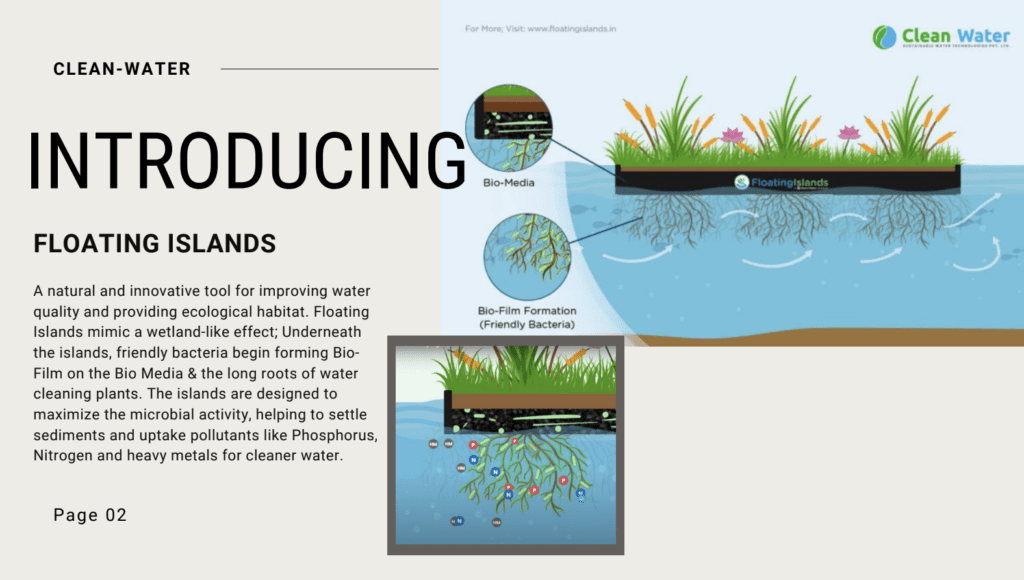
Clean-Water took a unique path among sustainable organizations. They stayed true to nature, taking inspiration from the way water rejuvenates itself. It’s like nature’s own cleansing cycle, but they turned it into something tangible – Floating islands. These are essentially platforms decked out with various plant species that work wonders for water quality. They act as nature’s buffer, handling pesky nutrient surges, amping up oxygen levels, and dialing down phosphorus. It’s a far cry from the chemical or reverse osmosis methods that can harm aquatic life and often fall short on big projects. Alongside these floating islands, Clean-Water also brings in aerators and bacterial solutions to breathe life back into our water bodies.
A swift and efficient solution
When it comes to water, almost anything that’s not good old H2O can mess things up – whether it’s chemicals, organic stuff, heavy metals, or just a wonky pH balance. Clean-Water’s got it covered with their three-pronged attack: floating islands, aerators, and bacterial solutions.
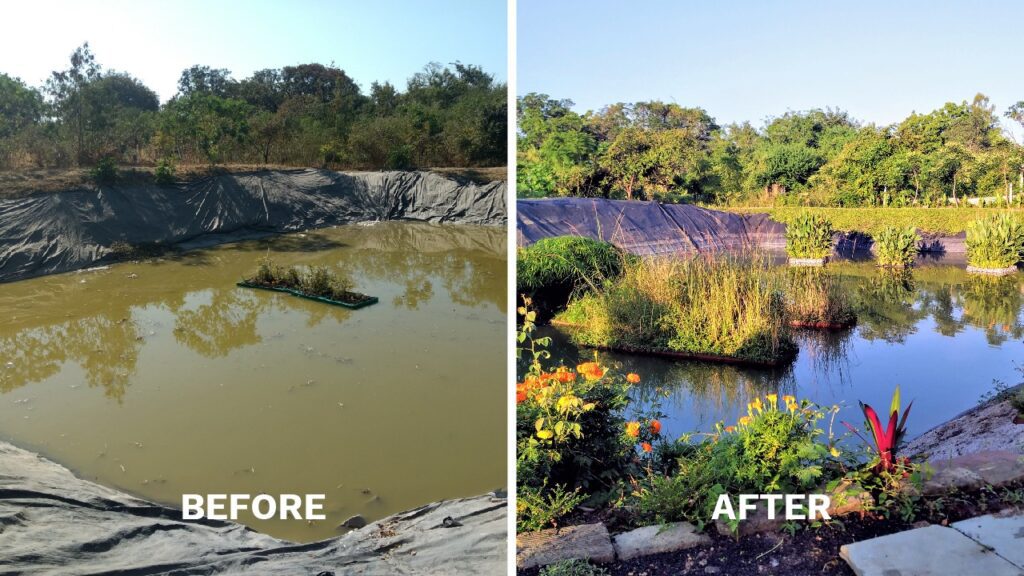
Clean-Water isn’t just about making things better; they’re also big on research. In 2019, they teamed up with CDD India, a non-profit, to set up a research hub on the BEL (Bharat Electronics Limited) campus in Bangalore. The endeavour helps the company build a solid research background while gathering data from on-field work.
“We’ve been setting up research and academic projects everywhere. Besides this, we’re also doing lake and river rejuvenation projects simultaneously. Through this we can build up a good academic and research background as when while gathering data from on-field work,” said Kumath.
The company’s work is swift and efficient. When a prospective client reaches out about a certain polluted river or lake, Clean-Water immediately reaches out with a recommendation on the required amount of wetlands, aerators, or bacterial solutions necessary to restore the waterbody. Once the work order is set in motion, it takes about a month to manufacture the wetlands; 4-5 days to ship them to the waterbody; and usually a 1-day installation. As aerators and bacterial solutions are ready-made products, they barely require a 10-day installation.
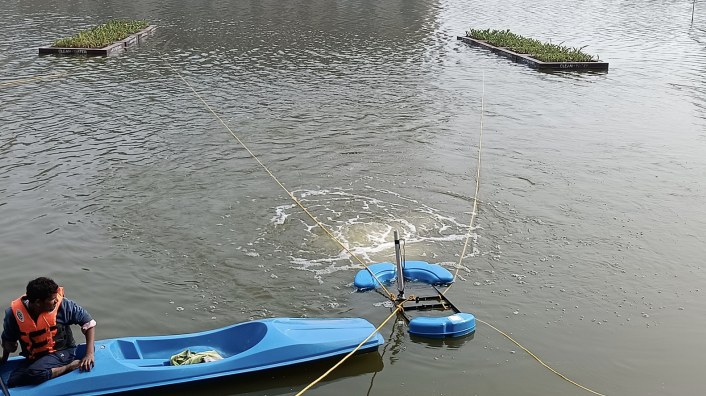
When the roots of the plants on the floating island touch the water, they become fully self-sufficient and require no care. The plants kickstart their natural process to clean the water. The work is further aided by the excellent company team and on-ground support that carries out every project meticulously.
A steady portfolio that showcases their efforts and success
For six solid years, Clean-Water bootstrapped its way through some impressive projects. In early 2023, they finally dipped their toes into funding. As one would expect, their dedication to reviving water got a thumbs-up from the Central Government of India, landing them a Rs 20 lakh grant under the AMRUT 2.0 scheme.
When the Nalanda Sarovar pond inside the Police Training Academy in Indore was steeped under the detrimental effects of nitrogen and phosphorus; Kumath and his team focused their efforts towards its betterment. Through the tried and tested methods of floating islands, biofilters, and aerators, the river gradually reached the peak of its true beauty.
“After we restored that pond and turned the water from green and brown to completely transparent, we saw a major boost in biodiversity, plus the residents of the campus started to come and spend time at this rejuvenated pond,” said Kumath regarding the success of the Nalanda Sarovar project.
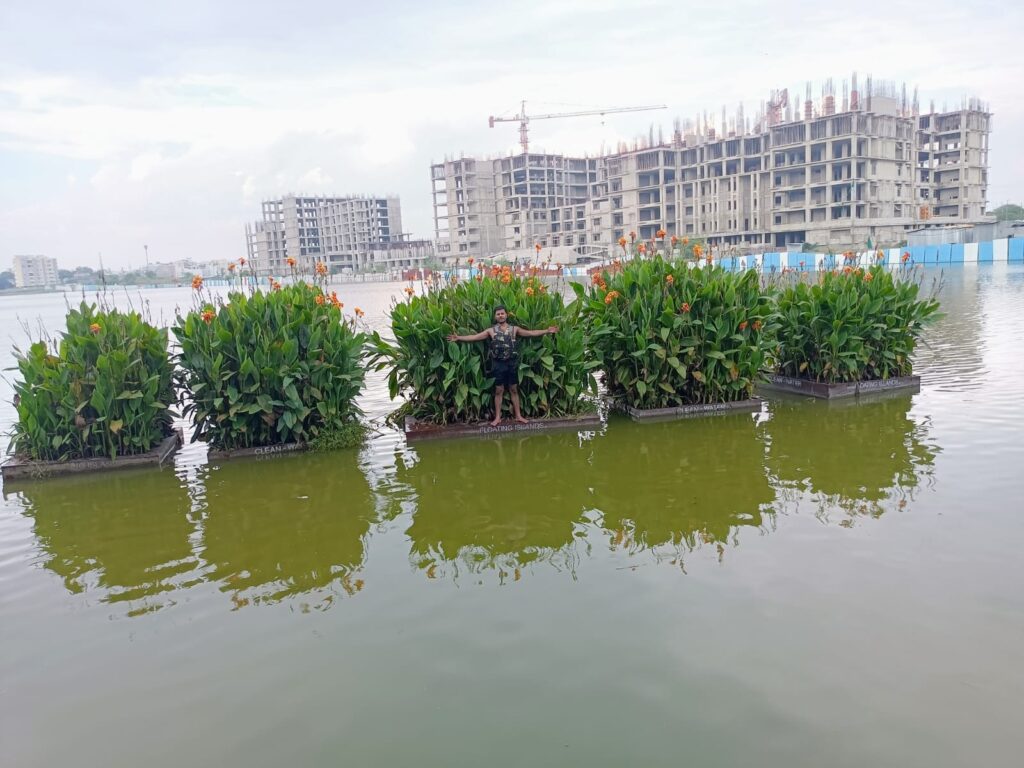
After the steady successes of his projects, Kumath’s vision only broadened; he set his sights on Indore’s 15-acre Pipliyahana Lake. The journey started in late 2021, when Kumath was preparing for his wedding. The environmentalist asked his family and friends not to gift him anything but instead donate the money towards the fundraiser that will support the lake restoration project.
Clean-Water installed five floating islands in the lake as a starting point. In a stroke of luck, it became one of the winners from the 75 startups shortlisted across the country for demonstrating water-based pilot projects. From the 20 lakh grant from the government, they set up eight more islands in the same lake, with four floating aerators and bacterial solutions.
A road with anticipated highs and lows
For his efforts with the Nalanda Sarovar project, Priyanshu Kumath received rightful recognition from the government in the form of the title “Water Hero” in 2019. Only two years later, with an increasing number of accomplishments under his belt, Kumath received the title of “Jal Prahari” from the Jal Shakti Ministry. Yet, these applaudable accomplishments did not come without their own set of challenges.
“We’ve received recognition and grants from the government but I would still say that the support from the government could be far better. Now that we’ve deployed and successfully demonstrated our solution, the government should be more proactive in helping us and scaling this to the millions of waterbodies in India,” relayed Kumath regarding Clean-Water’s hopeful future.
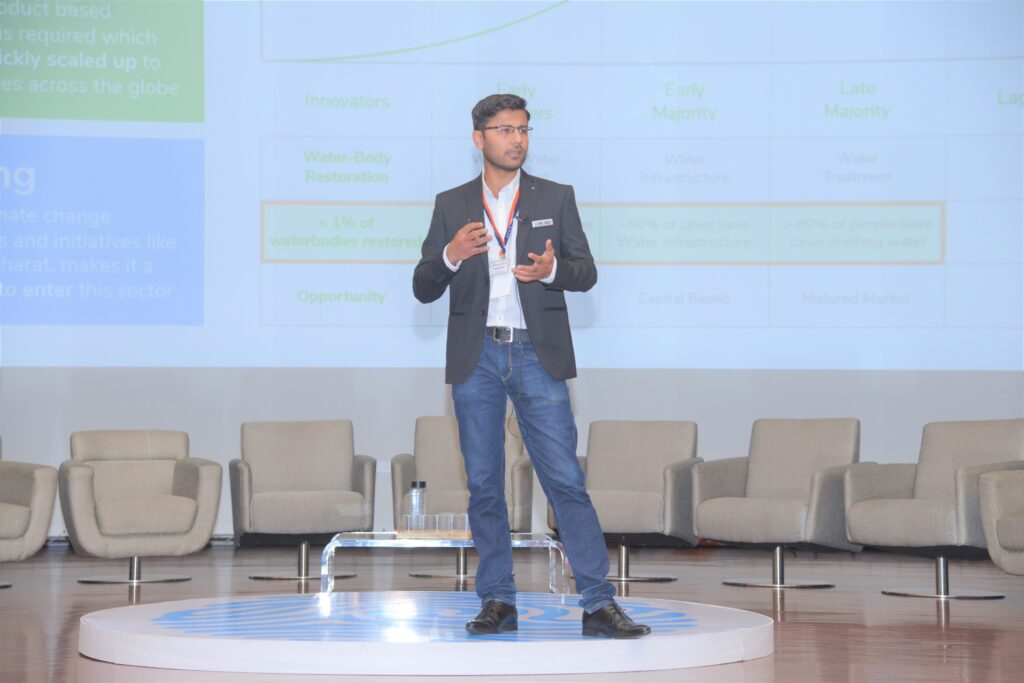
Clean-Water faced its share of challenges on the path to a cleaner water world. They had to work hard to earn trust in a skeptical client landscape. Corruption and favoritism had seeped into the water restoration industry; many corporations set up Sewage Treatment Plants just to check the legal box and gain a No Objection Certificate (NOC). These issues gave too much power to the Pollution Control Board and led to shady practices. Clean-Water had to hustle to navigate these hurdles, staying true to their goal of fighting water pollution.
To add to the difficulties, their clients weren’t always easy either. Some builders were notorious for being late with payments or refusing to pay upfront. In some cases, these builders used projects as mere tools to manipulate the Pollution Control Board, dragging projects on for years. To steer clear of this mess, Clean-Water’s winning move was adopting a product-based approach; ensuring a full commitment from start to finish.
A vision dedicated towards a sustainable future
Priyanshu Kumath’s vision for his company is crystal clear: a world with clean water and thriving ecosystems. When it comes to water security, he’s got two key goals in mind. First, ensuring there’s plenty of water available for everyone. Second, making sure that water is clean and safe to drink. Clean-Water doesn’t limit itself to one corner of the world; they’re on a mission to reach as many places as possible. Their main aim? Boost per capita water availability by protecting, reviving, and supporting India’s lifeblood – its water bodies.

